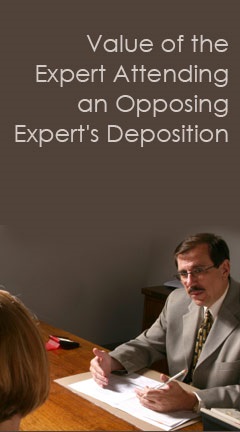Aviso de archivo
Esta es una página de archivo que ya no se actualiza. Puede contener información desactualizada y es posible que los enlaces ya no funcionen como se pretendía originalmente.
Home | Glossary | Resources | Help | Course Map
The expert may be asked to attend the deposition of an opposing expert. Following are some preparatory steps the expert should take to maximize the value and effectiveness at the deposition of an opposing expert or adverse party. The expert should:
- Survey applicable literature.
- Examine available reports of the evidence testing and any other relevant events.
- Complete the preliminary examination.
- Find out the proffering attorney's objectives for the deposition.
- Outline areas of inquiry the expert thinks the attorney should follow.
- Examine the preliminary report to identify which areas are still unclear or unresolved, and suggest how the deposition responses could help provide answers.
- Learn as much as possible about the opposing expert.
If the expert is present at the deposition of the opposing party or their expert, the expert can assist the proffering attorney in a number of ways. The expert should keep the following guidelines in mind at such times:
- Observe all of the attorney's admonitions.
- Take notes.
- Do not confer with the attorney during examination; instead, wait for an appropriate break.
- Carefully observe the witness's demeanor and make appropriate notes.
- Observe what items are kept available to refresh the witness's recollection.
- Note possible areas of further inquiry.
- Try to determine the outline being followed by the examining attorney.
- Write a summary memo of all of the notes shortly after the deposition, when impressions are still fresh.
- Use the deposition as a tool to help the expert become a better witness. The ability to respond to questions will be improved by observations of the opposing expert.
Additional Online Courses
- What Every First Responding Officer Should Know About DNA Evidence
- Collecting DNA Evidence at Property Crime Scenes
- DNA – A Prosecutor’s Practice Notebook
- Crime Scene and DNA Basics
- Laboratory Safety Programs
- DNA Amplification
- Population Genetics and Statistics
- Non-STR DNA Markers: SNPs, Y-STRs, LCN and mtDNA
- Firearms Examiner Training
- Forensic DNA Education for Law Enforcement Decisionmakers
- What Every Investigator and Evidence Technician Should Know About DNA Evidence
- Principles of Forensic DNA for Officers of the Court
- Law 101: Legal Guide for the Forensic Expert
- Laboratory Orientation and Testing of Body Fluids and Tissues
- DNA Extraction and Quantitation
- STR Data Analysis and Interpretation
- Communication Skills, Report Writing, and Courtroom Testimony
- Español for Law Enforcement
- Amplified DNA Product Separation for Forensic Analysts


